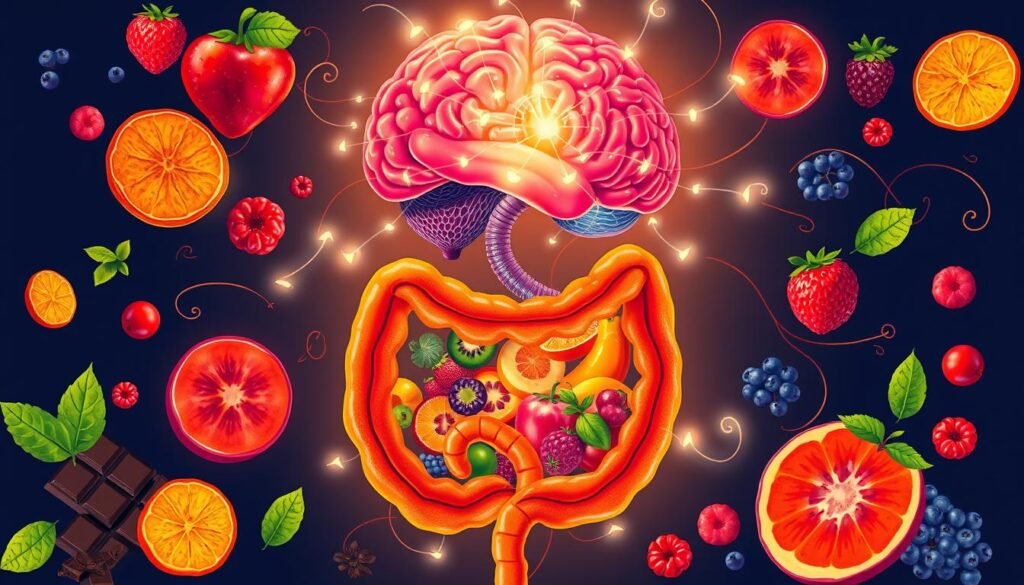About 300 million people were facing depression worldwide in 2017. This equals about 4.4% of everyone on Earth. It shows the need to look at how what we eat affects our minds. Studies prove that what we eat can change how we feel and think.
Swapping junk food for fruits and veggies can fight depression. A big review of studies backs this up. It tells us that diet and depression are closely linked. Given that 66% of adults know about this link, many are ready to change their eating habits for a happier mind.
Key Takeaways
- Prevalence of depression globally reaches 300 million people, highlighting a major public health issue.
- Healthy dietary patterns can lower the risk of developing depressive symptoms.
- Two-thirds of adults understand the link between diet and mental health.
- Most adults are willing to modify their diet to improve mental well-being.
- Nutrition plays a vital role in managing and potentially alleviating depression.
Understanding Depression and Its Impact on Health
Depression is a big issue in public health, touching the lives of millions. Around 300 million people are dealing with it. This makes up about 4.4% of people everywhere.
It’s the top reason why people can’t work or live their lives to the fullest. This shows why we must find better ways to help those with mental health issues.
Prevalence of Depression in Society
Depression affects people from all walks of life. It’s part of a bigger picture that includes other mental issues like bipolar disorder and schizophrenia. It’s important to understand how common depression is. This helps in raising awareness and supporting those in need.
Economic Costs Related to Depression
The cost of depression hits hard, costing about one trillion dollars every year. A lot of this comes from not being able to work as much. This huge cost shows why we must see depression as both a health and economic problem.
By putting money into treatments and support, we can lessen the impact. Things like better diets can help. This will save both money and lives.
The Connection Between Diet and Mental Health
Nutritional psychiatry looks at how what we eat affects our feelings and mental health. It combines nutrition and mental health care. By linking diet and emotions, experts offer new insights into diet and mental health.
What Is Nutritional Psychiatry?
Nutritional psychiatry shows nutrition’s significant role in managing mental health. Specific foods can actually make our mood more stable. The health of our gut plays a role too, affecting how we feel. Gut bacteria produce chemicals important for our brain, including serotonin, which stabilizes mood.
The Role of Healthy Eating Patterns
What we eat is closely tied to how we feel. For instance, the Mediterranean diet, full of good stuff like fruits, veggies, and lean proteins, helps fight depression. It provides important nutrients and boosts our mood. Eating complex carbs like whole grains keeps our energy and mood steady.
Research says that people who eat healthily suffer less from depression. Diets, especially Mediterranean ones, improve mental health. Experts suggest keeping a food diary to track what you eat. They also advise cutting down on ultraprocessed foods, which are too common in American diets.
Paying attention to what we eat leads to better mental health care. It shows how crucial good nutrition is for our emotions. For more on how good food affects our mood, check out research on diet and mood. Also, look into nutrition for improving mental health.
How Diet Affects Depression
The link between what we eat and how we feel is getting more attention. Studies show that our diet impacts our mood greatly. Knowing how crucial good food is for our mental health is essential.
Research Linking Nutrition to Mental Health
Nutritional psychiatry is a field exploring how diet affects our mental state. For example, our brain needs glucose from foods like bread and pasta for energy. Foods high in healthy fats, like fish, are also vital for our brain’s health. Eating lots of whole grains, fruits, and veggies gives us vitamins and minerals that help manage our mood.
Research finds that eating nutrient-rich foods helps reduce depression. People eating healthier diets feel happier and more content. Following a diet full of good foods, like the DASH diet, has been shown to lower depression symptoms.
Understanding Dietary Patterns
What we eat plays a big role in our mental health. Eating too much processed food, sugary snacks, and bad fats isn’t good for our mood. But including proteins from fish, chicken, or plants can really help. These foods have tryptophan, which is good for our mood. Plus, eating fiber-rich foods leads to a healthier gut and better mood.

Drinking enough water and not too much alcohol or caffeine is important too. Too much caffeine and alcohol can harm our mood. But staying hydrated is key for our brain to work best. Making healthy eating a regular part of life can help fight depression.
If you want to know more about how diet affects mental health, check out these research studies.
The Mediterranean Diet: A Case Study
The Mediterranean diet is famous not only for its tasty food but also for its mental health benefits. It helps with depression and anxiety. The diet includes fruits, vegetables, whole grains, nuts, and olive oil. People eating this way tend to feel better mentally.
Key Components of the Mediterranean Diet
This diet focuses on important dietary components for mental health:
- High consumption of fruits and vegetables
- Inclusion of whole grains
- Nuts and seeds as daily snacks
- Olive oil as the primary fat source
- Moderate intake of fish, and limited red meat
- Reduction of sugar and processed foods
These parts of the diet lower the chance of mood problems. Following this lifestyle improves both physical and mental strength. It’s especially good for those with depression and anxiety.
Effects on Depression and Anxiety
Studies show the Mediterranean diet helps improve mental health. In one study, 60 people were observed for 12 weeks. Those on the diet lost weight and reduced their BMI. They also saw a decrease in depression symptoms. A high diet adherence led to a notably lower depression risk.
About 4.7% of people worldwide suffer from major depression; anxiety affects 7.3%. In Iran, 21% of adults face mental health challenges. The Mediterranean diet offers a complete approach to prevent mood disorders. It suggests a link between diet and mental health. This indicates how diet changes can help ease depression and anxiety.
| Adherence Level | Hazard Ratio (HR) | Confidence Interval (CI) |
|---|---|---|
| Medium Adherence (Score 4-5) | 0.90 | 0.81-1.00 |
| High Adherence (Score 6-9) | 0.82 | 0.71-0.94 |
| Each Unit Increase in Adherence | 0.95 | 0.92-0.98 |
Anti-Inflammatory Foods and Their Benefits
Chronic inflammation affects our minds, playing a big part in mental health issues like depression. Studies show a link between the food we eat and our mental state. Foods causing inflammation can increase the risk of depression. It’s important to know which foods can fight this inflammation, especially for improving mental health through diet.
Understanding Inflammation and Mental Health
Many studies have found a connection between diets high in inflammatory foods and mental health problems. One such study, published in the Journal of Affective Disorders, involved over 30,000 people. It found that diets high in inflammatory foods increased the risk of depression. Another study, from the Framingham Heart Study with 1,701 participants, showed a similar pattern. High levels of dietary inflammation were linked to a greater chance of frailty and mental health issues.
Specific Anti-Inflammatory Foods
Adding anti-inflammatory foods to your diet offers great benefits, especially for your mental health. Some top choices to consider include:
- Fatty Fish: Rich in omega-3 fatty acids that are known to reduce inflammation.
- Berries: Packed with antioxidants that can lower inflammation levels.
- Leafy Greens: Vegetables like spinach and kale provide vital nutrients that combat inflammation.
- Nuts: Nuts such as walnuts and almonds can also help reduce inflammatory responses.
- Olive Oil: Particularly extra virgin olive oil, is recognized for its anti-inflammatory properties.
Adding these foods to your diet helps fight inflammation and boosts overall health. The Mediterranean diet, rich in these foods, is often linked to lower depression rates. This is likely because of the anti-inflammatory effects of the foods it includes.
| Food | Anti-Inflammatory Benefits |
|---|---|
| Fatty Fish | Rich in omega-3 fatty acids, decreases inflammatory markers. |
| Berries | High in antioxidants, protects against inflammation. |
| Leafy Greens | Contains various vitamins and minerals that combat inflammation. |
| Nuts | Contains healthy fats and compounds that reduce inflammatory levels. |
| Olive Oil | Extra virgin variety possesses potent anti-inflammatory characteristics. |

The Gut-Brain Connection
The gut-brain connection is an intricate link between our digestive system and how we feel. It largely depends on our gut’s health, which affects our mood. Knowing how food impacts our gut can improve our emotions.
The Influence of Gut Microbiome on Mood
Most of the body’s serotonin, which makes us feel good, is made in the gut. The gut’s microbes play a big part in making serotonin, affecting our mood. People with social anxiety disorder have different gut bacteria than those without it.
Those with healthier gut bacteria handle stress better and stay calmer in tough situations. Probiotics might help with depression and anxiety. They show the strong link between our gut health and how we feel.
Dietary Impacts on Gut Health
What we eat changes our gut bacteria, with high-fiber foods being great for good bacteria. Eating foods high in prebiotics can lessen depressive symptoms. Exercise helps too, by making our gut bacteria more diverse, which is good for health.
But, bad habits like too much alcohol or smoking can harm our gut balance. A Mediterranean diet helps keep our gut healthy, improving our mood through food choices.

Nutritional Deficiencies Linked to Depression
Not getting enough nutrients can really affect your mood, especially causing depression. Knowing which nutrients you’re missing is key. It helps figure out what’s causing the depression. Making changes to what you eat can make you feel better mentally.
Common Nutritional Deficiencies in Adults
A lot of adults don’t get enough of certain nutrients, and this can impact mental health big time. Here are some key ones:
- Vitamin D: There’s a clear link between not having enough vitamin D and feeling depressed. Research with over 31,000 people shows this.
- Vitamin B12: If you’re not getting enough vitamin B12, you might feel more depressed.
- Iron: Many women don’t have enough iron. About 57.5% of women in some studies were found to be iron-deficient.
- Zinc: Not having enough zinc is related to mood problems, but taking extra zinc can help make antidepressants work better.
- Omega-3 Fatty Acids: These fats are super important for your brain. Not having enough omega-3s can lead to depression.
How Deficiencies Affect Mood and Behavior
Nutrient shortages really mess with your mood. They throw off the balance of chemicals in your brain like serotonin. This often leads to depression.
Not having enough nutrients can make you feel all sorts of bad. Here’s how:
- Increased irritability and mood swings
- Fatigue and less drive to do things
- Struggle with making decisions
- More anxiety and depression
Seeing how diet and mood are connected shows why eating right is so important. A good diet that has all the nutrients you need can help improve how you feel mentally. It can help reduce depression symptoms. Check out more about this at immune-vitality.com.
Mood-Boosting Nutrients to Incorporate
Nutritional components are key for mental well-being. Adding certain nutrients to your diet can make you feel better mentally. These include vitamins, minerals, and omega-3 fatty acids. They help with emotional balance, brain function, and mood.
Vitamins and Minerals Essential for Mental Health
Many vitamins and minerals are vital for our mental health. They can lower the risk of mood disorders. They also help keep our minds strong.
- Vitamin D: It can lessen depression symptoms. You can find it in oily fish, fortified dairy, and eggs.
- Folate (Vitamin B-9): This vitamin supports the nervous system. It can cut down mood disorder risks. It’s in dark leafy greens and fruits.
- Selenium: It’s known to lift your mood and ease anxiety. Whole grains and Brazil nuts are good sources.
- Zinc: This mineral helps antidepressants work better. Find it in oysters, beans, and nuts.
- Omega-3 fatty acids: They may help manage depression. You can get them from cold-water fish and flaxseed.
The Role of Omega-3 Fatty Acids
Omega-3s are great for improving your mood. Studies show they lower depression risk. These fats fight off inflammation, which can be linked to feeling down:
- Salmon and sardines are top sources of omega-3s.
- For plant-based options, try flaxseed and walnuts.
- Eating these foods helps improve mental health and lower anxiety.
Adding mood-boosting nutrients to your meals can really help your emotions. Eating foods rich in these vitamins helps you manage your feelings better.
Lifestyle Factors That Influence Diet and Depression
Lifestyle choices greatly affect what we eat and our mental well-being. Being active can make people feel happier and less depressed. On the other hand, some people eat because of their feelings. This can lead to unhealthy eating and worse mental health.
The Impact of Physical Activity
Being physically active is key to staying mentally healthy. Exercise helps release endorphins, improving mood and easing anxiety. A lot of research shows the link between staying active and feeling better mentally. People who exercise regularly tend to feel less depressed and anxious. Besides eating better, making exercise a habit is vital for better mental health.
Understanding Emotional Eating Habits
Emotional eating means eating to cope with stress or sadness. This habit can lead to bad eating patterns. It can also hurt your physical activity and mental health. Learning what triggers emotional eating is the first step to breaking this habit. The link between diet and mental health shows dealing with emotional eating helps in making better lifestyle choices.
Conclusion
Nutrition plays a key role in managing mental health, especially depression. Studies with over 45,000 people found that better diets can lessen depressive symptoms. This shows that eating healthy might help lower the chance of getting depressed.
Mixing diet changes with other treatments could help those with depression. For example, omega-3 fatty acids and zinc can improve mood. Adding these to regular mental health care can give better results.
Improving mental health by focusing on diet is a proactive step. It’s backed by current research. Both individuals and doctors should think about how diet can help traditional depression treatments work better.